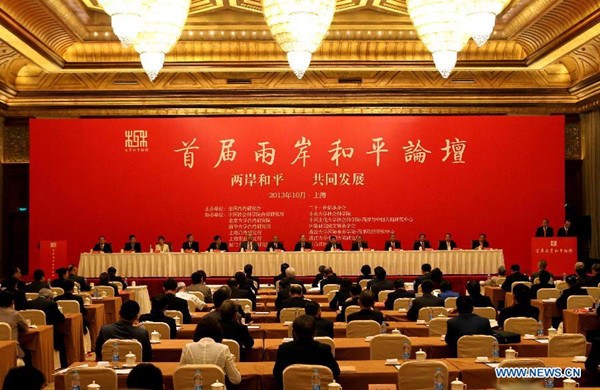

Participants at the first cross-Strait peace forum have suggested the two sides create conditions for meetings between leaders, engage in military exchanges, set up a coordination mechanism for external affairs, and enhance maritime cooperation.
The mainland and Taiwan should actively foster conditions for meetings between leaders of the two sides and make arrangements for the form and content of such occasions, according to forum minutes announced at the closing ceremony on Saturday.
Participants agreed both sides should consider conducting military contacts and exchanges to promote stability in the Taiwan Strait and alleviate worries over military security.
Such exchanges could start with cooperation in humanitarian aid and disaster response, exploring the possibility of signing maritime security agreements, and holding seminars, they suggested.
To cope with mutual challenges, authorities should cooperate in maritime affairs such as conservation of maritime living resources, protection of fishery, fishermen and the maritime eco-environment, safeguarding maritime transport security, emergency rescue, joint development of energy and tourism, scientific research, law enforcement, and maritime security, the document said.
Participants also suggested the two sides gradually set up a communication and coordination mechanism for external affairs so as to properly handle cases in which non-governmental institutions or individuals across the Strait plan to participate in the same non-governmental or civil international events at the same time.
In addition, the two sides should enhance coordination and cooperation in external economic affairs to work toward their common interests, the document said.
The mainland and Taiwan should jointly explore and gradually form understanding or consensus on their political relations so as to establish a stable framework for cross-Strait peaceful development, it added.
Launching cross-Strait political dialogues and negotiations will help the two sides end confrontation and discuss an agreement for safeguarding peace which is endorsed by people across the Strait, according to the forum minutes.
Despite the consensus reached among academics from both sides, their views differ on particular issues, such as how to make reasonable arrangements for cross-Strait political relations in the context of continued political confrontation; how to clarify the legal relationship between the one-China framework and the existing rules of the two sides; the political meaning of an official end to the state of hostility between the two sides; and how to establish a mechanism to build confidence in military security across the Strait.
While addressing the opening of the 18th National Congress of the Communist Party of China (CPC) last November, Hu Jintao, former general secretary of the CPC Central Committee, suggested the mainland and Taiwan set up a military security confidence-building mechanism and reach a peace agreement through consultation.
Hu suggested the two sides jointly explore cross-Strait political relations and make reasonable arrangements under the special condition that the country has yet to be reunified.
Yan Anlin, a cross-Strait affairs expert with the Shanghai Institutes for International Studies, said the minutes covered various cross-Strait issues, including political relations, external affairs, security, mutual trust and a peace agreement, which were previously deemed "sensitive areas."
"As the result of brainstorming by think tanks, which have diverse political backgrounds, these proposals are of reference value to authorities on both sides," said Yan, also a participant in the forum.
Yan pointed out that despite the consensus made, it would be very difficult to discuss political issues upon which the participants could not agree.
"However, such non-official political discussions should be continued," he said.
"Such discussions make political subjects that used to be considered sensitive and mysterious no longer that mysterious, and make people begin to realize that holding talks is better than keeping these issues unattended," Yan said.
Organized by the mainland-based National Society of Taiwan Studies and Taiwan's 21st Century Foundation and 12 other major think tanks and academic institutions from both sides, the two-day event was attended by about 120 experts and academics, with about 60 from each side.
The second cross-Strait peace forum is scheduled to be held in Taiwan next year.
The organizers will discuss the possibility of establishing a permanent institution for the forum. They also plan to invite academics to set up research groups to study the issues discussed at the just-concluded forum and submit their results to the next forum for discussion.
Copyright ©1999-2018
Chinanews.com. All rights reserved.
Reproduction in whole or in part without permission is prohibited.